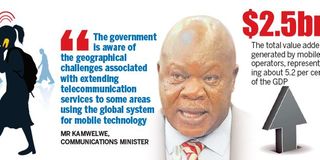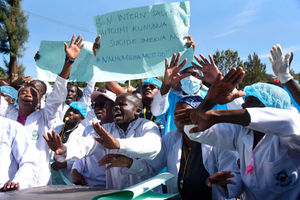How telecoms can boost contribution to economy

Dar es Salaam. The mobile industry, which currently contributes about 5.2 per cent of Tanzania’s gross domestic product (GDP), can do even better if regulators work on at least six issues, a new report shows.
The 2019 GSMA Digital Transformation in Tanzania report, which was launched yesterday, shows that mobile industry firms have injected some Sh6 trillion in the country during the past years, adding that more could be invested if some hurdles are worked on.
The report comes three months after the government signed with telecommunication firms on December 14, 2018 contracts that would see the country extending telecommunication services to remote areas under the Universal Communications Access Fund (UCSAF).
The Sh28.3 billion contracts, signed between the Minister for Works, Transport and Communications, Mr Isack Kamwelwe, and representatives from TTCL, Halotel, Vodacom and Tigo, will see communication services reach a total of two million people in 490 villages.
Speaking during the signing event, Mr Kamwelwe said the government was aware of the geographical challenges associated with extending telecommunication services to some areas using the global system for mobile technology, noting that the government was working with various players to come up with alternative technological systems.
According to GSMA, in 2016, the total value added, generated by mobile operators – taking into consideration all the direct, indirect and productivity effects – stood at $2.5 billion, representing about 5.2 per cent of GDP then.
But GSMA, which is a trade body that represents the interests of mobile network operators worldwide, uniting about 750 operators with over 350 companies in the broader mobile ecosystem, said in the report that the contribution could rise to $4 billion in 2020 (next year) and account for six per cent of Tanzania’s GDP.
Tanzania’s mobile market is served by eight mobile operators, which, with their market shares in brackets, are Vodacom (32 per cent), Tigo (29 per cent), Airtel (26 per cent), Halotel (9 per cent), Zantel (2 per cent), TTCL (1 per cent), Smart (1 per cent) and Smile (1 per cent).
GSMA lead analyst Kenechi Okeleke said since the investment in the sector act as an enabler to achieving development goals, policy consistence and predictability were key.
“Policy consistence and predictability are essential to sustaining investor confidence in the industry,” he said.
To achieve this, he added, the sector’s regulator needed to establish a conducive legal framework for new policies and should ensure that all technical and implementation requirements have been given due consideration.
Mr Okeleke said regulators also needed to adopt a standard process in the enforcement of regulations to enable consistence in terms of assessing mobile operators’ compliance.
The report also opined that there should be a room for more active forms of infrastructure sharing, especially in rural areas.
It pleaded for fair access to public infrastructure such as government buildings, roads and power line, to take down the cost of network deployment.
“The industry needs an enabling environment to attract investment of private sector financial and technical capabilities for its (industry) prosperity,” reads the report in part.
The report further suggested that the government and regulator should make the right spectrum decisions.
These, the report further states, include ensuring operators have access to sufficient spectrum in a timely and affordable manner, providing support for new network investments and avoiding costly restrictions on spectrum use.
In so doing, through improving access and increasing the scale and sustainability of key services, enhancing productivity and efficiency, the industry would help the government achieve her development goals.
He added that mobile industry was important due to its contribution to Gross Domestic Product (GDP) and good governance initiatives.
The industry, which until last December, had 43.62 million voice telcom subscribers, employs 1.5 million people directly and indirectly. “We can no longer overlook the critical role of the mobile industry plays in our economy. The industry is the critical enablers to eradicating poverty in all its forms and achieving the sustainable development agenda,” said.




